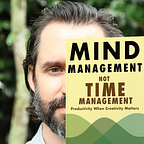Genius doesn’t appear out of thin air. Build your creative vocabulary.
I don’t really like to watch improv. Don’t get me wrong, I think improvisation is a valuable creative tool, I just don’t enjoy watching it as an art form.
When friends do manage to drag me along to watch improv, I often ask what the appeal is. A common response is that “I can’t believe they just think of those things off the top of their heads!”
Let me tell you a secret about improv: They aren’t just thinking of it off the top of their heads. Improv comedians have built a creative vocabulary.
This may ruin improv for you, or it may not. In any case, it’s a valuable lesson in making your art.
If you keep practicing your art day in and day out, you start to build a creative vocabulary. It’s a grab-bag of tricks that you can use over and over again. You can mix and match them in countless ways.
Take those improv comedians, for example. Yes, they just took a suggestion from the audience, and yes, they built a scene, and something funny happened. It’s probably the only scene they’ve ever done that’s exactly like that, and that’s probably the only time they’ve made that exact joke.
But it didn’t appear out of thin air. They were pulling from their grab-bags of tricks. They’ve built skills in finding the first line to build a scene. They’ve built skills in establishing a relationship and situation in the scene. They, as improv partners, have even built subtle ways of communicating as the scene progresses.
Which is to say, they didn’t just think of it “off the top of their heads.” They practiced over and over again. They messed up a lot, and made lots of unfunny, boring, or just plain nonsensical scenes. All of that built their creative vocabulary. That preparation came together to create that moment that made you laugh. To you, it looks like magic. But really, it’s work.
The same is true of scripted comedy. Take Fred Armisen and Portlandia for example. He didn’t just wake up in 2011 and think of all of these characters. He had been lampooning hipster culture since before hipsters were even a thing.
Just watch his prank videos around Chicago in the 90’s, or his guide to the 1998 SXSW conference.
If you don’t see the resemblance to his current work, watch his Portlandia bike scene, then watch him prank a poetry slam—well over a decade prior—with this poem: “Watch out, I’m on my bike!”
It’s tempting to imagine that brilliance just comes “off the top of [someone’s] head.” It lets us ascribe giftedness to the “genius.”
Meanwhile, it helps us feel a little better about ourselves. If we haven’t been “gifted,” then it’s okay that we aren’t making our masterpiece. Then again, maybe one day it will just spout out of the top of our head. We can blame our busy schedule, and our Netflix queue for keeping us from making it real.
But when you recognize that you have to build a creative vocabulary in order to make your masterpiece, something powerful happens. You realize that you shouldn’t treat your ideas like caged birds. You realize that, instead, if you build a creative habit, fight through perfectionism, and treat each bit of work with the attitude that there’s always tomorrow, you can build the vocabulary to make something original, and make it look like it came out of nowhere.
I’m writing Getting Art Done. It will help you build your creative vocabulary, and make your masterpiece. Sign up for updates here »
